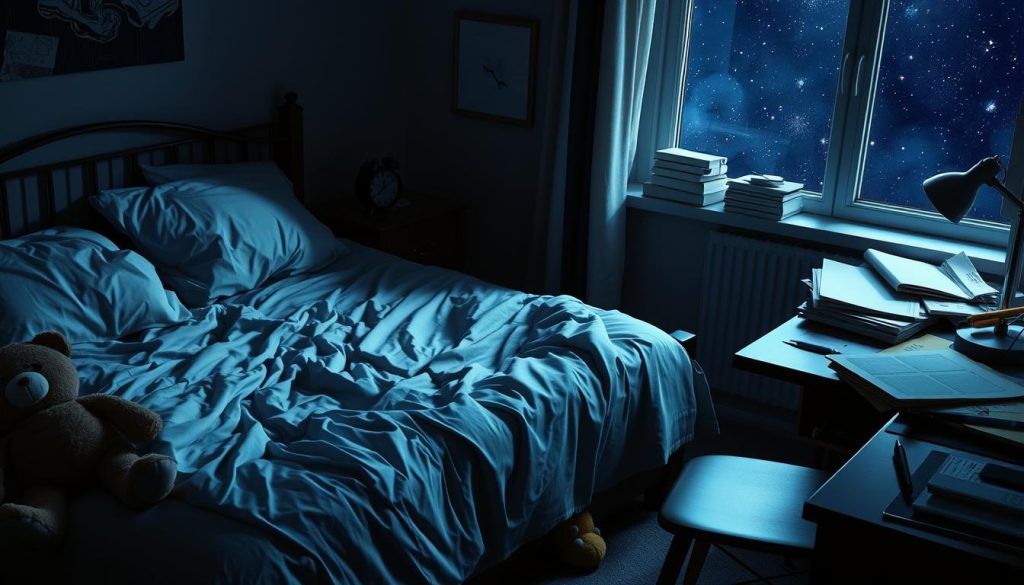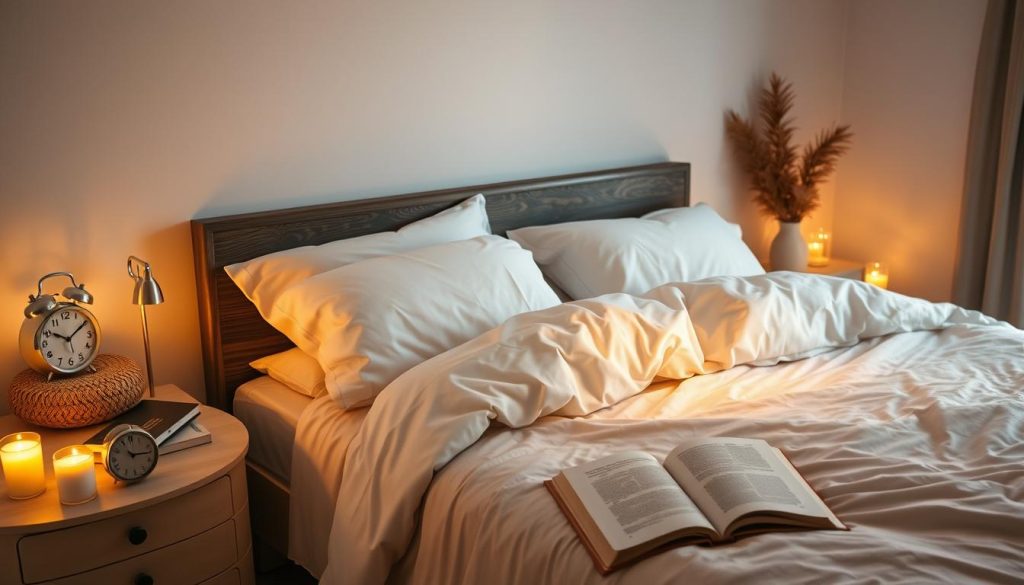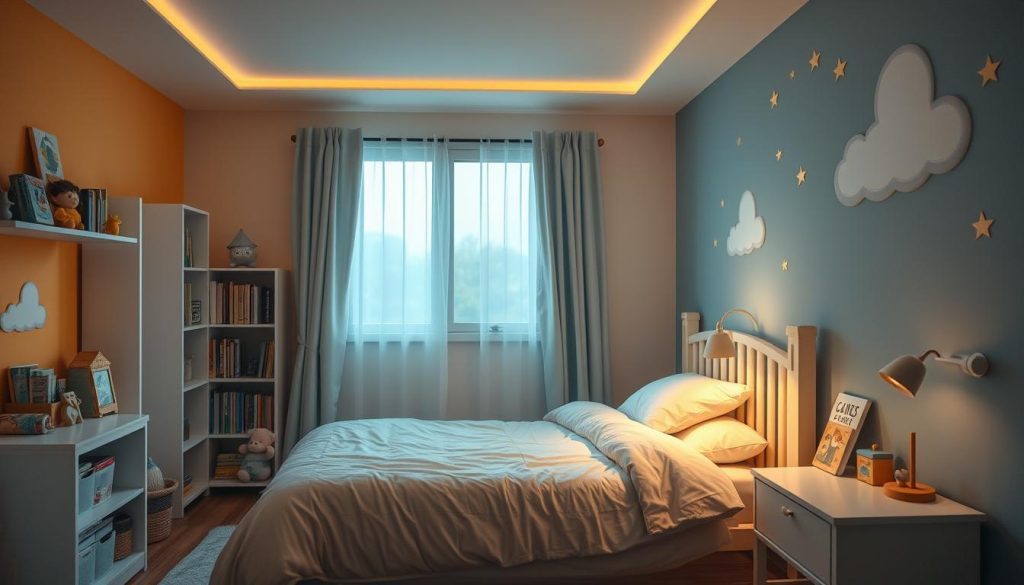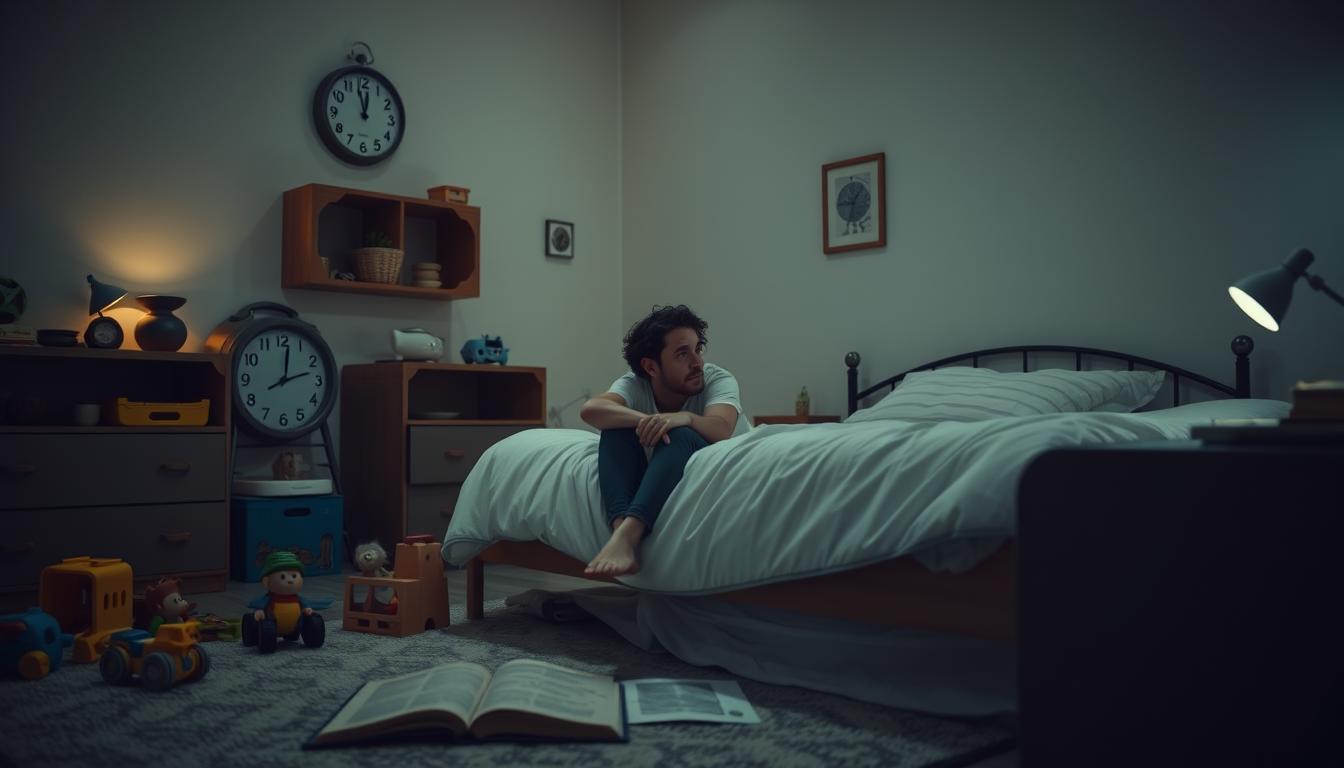Is it hard for your child to fall or stay asleep at night? If you’re dealing with sleep issues in older kids, you’re not alone. The pandemic has made sleep problems worse, causing more anxiety and changes in behavior.
Fixing these sleep issues needs a mix of strategies. Using Cognitive Behavioral Therapy for Insomnia (CBT-I) for kids is a good start. It’s often better than medicine and focuses on gradual changes and bravery. A regular sleep routine and a good sleep space are key to helping your child sleep well.
With the right strategies, you can beat these sleep problems. This ensures your child gets the rest they need to do well.
Key Takeaways
- Practice of sleep hygiene is crucial for promoting healthy sleep in kids.
- Transitioning during time changes: adjust bedtime by 15 minutes each day for five to seven days before the change.
- Nightmares may be triggered by scary movies, stories, or video games before bed.
- Creating a consistent sleep routine and conducive environment aids in better sleep habits.
- CBT-I for kids can be more effective than medication for treating insomnia in children.
- Consistency in setting bedtime can help in establishing a child’s internal clock.
- Reward systems can reinforce positive bedtime behavior in children.
Identifying Sleep Problems in Older Kids
It’s important to spot sleep issues in older kids for their health. Parents often see signs that mess with a child’s routine and health. Catching these problems early helps solve them.
Common Signs of Sleep Issues
Older kids with sleep problems show clear signs. These include snoring, trouble falling asleep, and waking up a lot at night. Feeling tired during the day and doing poorly in school are also indicators.
During the pandemic, many kids’ sleep got worse. This can cause bad behavior and more anxiety.

Talking to your child about their sleep worries helps. Up to 50% of kids have nightmares or sleepwalk. If sleep problems keep happening, it might mean there’s something deeper going on.
Impact of Sleep Deprivation on Kids
Sleep loss in older kids does more than just make them tired. It can cause accidents, mood swings, trouble focusing, and even eating too much. Helping kids with sleep anxiety can greatly improve their health.
Children aged 5-14 need 9-13 hours of sleep, and teens need 7-10 hours. Ignoring sleep problems can lead to more irritability, bad memory, and mental health issues like depression and anxiety. Getting help from doctors or child psychologists is key for chronic sleep issues.
Sleep loss is also linked to eating disorders in kids. This makes it hard for them to stay healthy.
Behavioral Strategies for Better Sleep
Fixing sleep issues in older kids needs a mix of methods. Behavioral strategies, like Cognitive Behavioral Therapy for Insomnia (CBT-I) and a steady sleep routine, are key. These help kids sleep better and feel better overall.
Using Cognitive Behavioral Therapy for Insomnia (CBT-I)
CBT-I is great for kids with insomnia. It helps them face and change sleep-related worries. Using gentle parenting with CBT-I makes kids feel safe and able to calm down at night.

Teaching kids to relax before bed is also part of CBT-I. Online family therapy adds more support. This way, kids can manage their fears and sleep better.
Creating a Consistent Sleep Routine
Consistency is crucial for healthy sleep habits. Regular bedtimes and wake-up times, even on weekends, help kids’ bodies adjust. It teaches them the value of a strict sleep schedule.
Experts say to include quiet activities for 20 minutes before bed. Reading or puzzles are good choices. Avoid scary media and caffeine close to bedtime for better sleep.
Regular physical activity during the day helps too. Sports or outdoor play burns energy and prepares kids for sleep. Good sleep habits and routines are essential for kids’ sleep management.
Creating a Conducive Sleep Environment
Creating a good sleep space is key for healthy sleep habits in kids. It’s about setting a regular bedtime routine and making their bedroom perfect. These steps can really improve their sleep and well-being.
The Importance of Sleep Hygiene
Sleep hygiene means doing things that help you sleep well. This includes keeping the room cool, avoiding caffeine, and not using screens before bed. Devices give off blue light, which stops melatonin from working, making it hard to sleep.
By following good sleep hygiene, like making the bedroom only for sleep, you help your child learn to sleep better. This makes them associate the bed with sleep.
Tools to Help Your Child Sleep
There are many tools and methods to help your child sleep better. Using apps for relaxation can make bedtime calmer. Tools like white noise fans and weighted blankets can also help by making the room quieter and more cozy.
Studies show that a comfy room temperature and little noise are important for good sleep. Dark rooms also help kids sleep better by blocking out light.

Eco-friendly parenting can also help with sleep. Choosing organic bedding can make it more comfortable and reduce allergies. Also, watching what your kids do on screens can stop them from getting too excited and having trouble sleeping.
In short, making a sleep-friendly environment with the right strategies and tools can greatly improve your child’s sleep. This leads to better health and more energy during the day. Parents are key in this by setting regular sleep times and routines, helping their kids sleep better.
Parenting Challenges: Helping Kids Sleep Independently
Helping your child sleep on their own takes creativity, understanding, and patience. It’s a big change, especially when they’re scared of the dark. But with the right steps, you can help them succeed.
Gradual Withdrawal Techniques
Behavioral techniques, like the gradual withdrawal method, work well. Start by being less present, but still make sure your child feels safe. If you need to stay in the room at first, slowly move to sitting by the door, then outside.
This method helps because it makes sleep schedules predictable. Studies show this is key for kids to sleep on their own.
Reward Systems and Progress Charts
Reward systems can really motivate kids. Make a chart to track their progress. Each night they sleep well, they get a star or sticker. When they collect enough, they get a reward.
This approach not only gives them something to look forward to but also shows them their progress. It’s a powerful tool. Add calming activities and bedtime rituals to make them feel safe and comfortable.
Good parenting tips include creating a positive environment. This is true whether you’re dealing with stepchild relationships or managing family budgets. These strategies make bedtime easier. With a careful plan and lots of encouragement, kids can learn to sleep independently.
FAQ
How can I handle my older child’s sleep problems during the pandemic?
How do I identify if my child has sleep problems?
What are the consequences of sleep deprivation in kids?
What behavioral strategies can help improve my child’s sleep?
What constitutes good sleep hygiene for children?
What tools can assist in creating a conducive sleep environment for my child?
How can I help my child sleep independently?
What are effective ways to maintain a consistent sleep routine?
How can I use reward systems to encourage my child’s sleep progress?
This post contains affiliate links. If you click on a link and make a purchase, I may earn a small commission — at no extra cost to you. Thank you for supporting this blog and helping me keep the patterns free! Read the full Affiliate Disclosure & Transparency.
